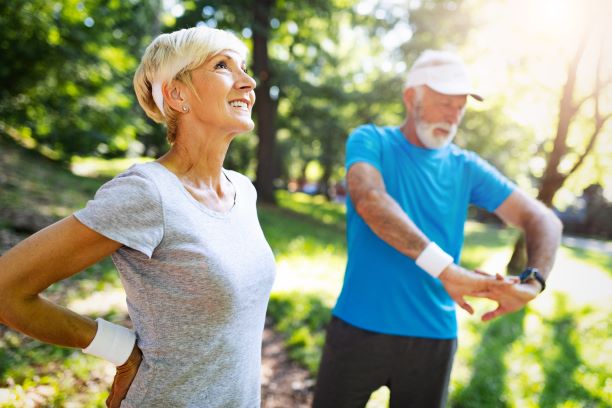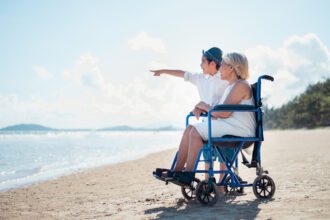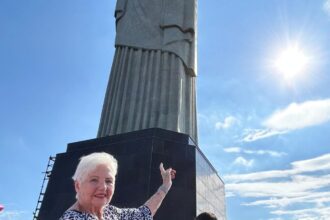It’s never too late to benefit from being more active
Its very important to stay active as you age, Judy Ross from Active Ageing Australia tells us more.
Physical activity is at the centre of well-being. No matter what our age, health or abilities, everyone benefits from staying active. Physical activity is especially important as we get older.
If we don’t keep active, moving becomes harder and muscles become weaker. Everyday activities become harder to do. This can mean that we move even less – MAKING THINGS EVEN WORSE. This is known as the ‘spiral of decline’ and is a common situation older people find themselves in. The good news is that it is never too late to slow down or even reverse this downward spiral. Even small changes in activity or small amounts of exercise can make a big difference to abilities, health and independence.
Why is physical activity so important?
Physical activity helps prevent illness and disease, makes it easier to recover from illness or injury, keeps us mobile and independent, and improves our brain and mood. Physical activity will reduce the risk of developing many diseases and will help manage chronic conditions, like:
- cancer
- cardiovascular disease
- type 2 diabetes
- high blood pressure
- high cholesterol and high blood sugar.
Being active also helps by:
- making everyday activities easier and more comfortable
- reducing the risk of falls and injury from falls
- building strength and stamina
- improving energy levels
- reducing some types of pain
- increasing bone density and strength
- keeping a healthy weight
- reducing joint stiffness and improving joint movement.
The benefits are not only physical. Being active will:
- improve sleep
- help with relaxation
- reduce stress
- increase optimism and positive mood
- improve problem solving skills and concentration levels
- increase confidence to stay connected with others and the community
- help prevent and manage mental health problems.
What type of physical activity is especially important as we get older?
Strength, balance, flexibility and cardiovascular exercise are all important – for different reasons. The really good news is that all of these abilities can be improved AT ANY AGE!
We need:
- Physical activity that builds muscle strength
- Physical activity that improves balance
- Physical activity that improves flexibility.
Exercises and activities that place more demand on our muscles will improve our muscle strength. These exercises use gym machines, the weight of our body, hand weights, ankle weights, resistance bands or even the resistance of water.
We need stronger muscles to improve our walking, climbing steps, getting out of a chair or bed, lifting and carrying things – and many more daily activities.
Exercises and activities to improve balance are very important to help keep us safe, living independently and not falling.
There are specific exercises to improve balance but leg and hip strength and stepping reactions also help. Research shows that people who do balance exercises regularly will have fewer falls, and if they do fall their injuries will not be as severe. Just like strength, balance can be retrained and improved at any age!
The more often we challenge our balance the quicker our balance will improve. This is why it is often suggested to at least do some simple balance exercises every day. Try holding onto a bench and standing on one leg while waiting for the kettle to boil or cleaning your teeth.
In a nutshell!
Exercises to improve our flexibility are those that keep our muscles and joints moving. Having more range of movement in our body helps us to move in the ways we need – to reach our feet, reach up high or low, turn to look behind or reach behind our body. These movements help keep us independent and doing the things that are important to us such as driving, dressing ourselves and virtually all daily activities. Flexibility improves ability!
Evidence tells us that not being active is a big health risk and leads to loss of muscle strength, balance, flexibility and joint mobility. This then causes a decline in the ability to manage everyday activities and independence. On the other hand, being active, doing activities and exercises which improve strength, balance and flexibility will improve our abilities and independence and quality of life. Giving you more life in your years AND more years in your life.
If you would like to find out more about physical activity visit Active Ageing Australia’s website; www.activeageing.org.au .
You will find a range of resources to help you to keep active. Use the code OneCOTA to receive a discount.
Strength For Life
COTA has delivered the Strength for Life: Live Longer, Live Stronger program in Victoria, SA and WA since 2001. Through support from the Australian Sport Commission, Move it AUS – Better Ageing Grant the program has expanded to NSW, the ACT, and Tasmania.
Strength for Life is an evidence based, progressive strength training program that enables and enhances older people’s capacity to be physically active and socially connected.
The program promotes the benefits of physical activity with focus on strength training, better balance, improved flexibility and enhance participants to undertake daily activities and independent lifestyles.
The Strength for Life program is currently delivered at more than 200 sites and growing.
For more information about the program and how to get started contact your local COTA:
Victoria (03) 9655 2100
SA (08) 8232 0422
WA (08) 9472 0104
NSW (02) 9286 3860
ACT (02) 6282 3777
Tasmania (03) 6231 3265










